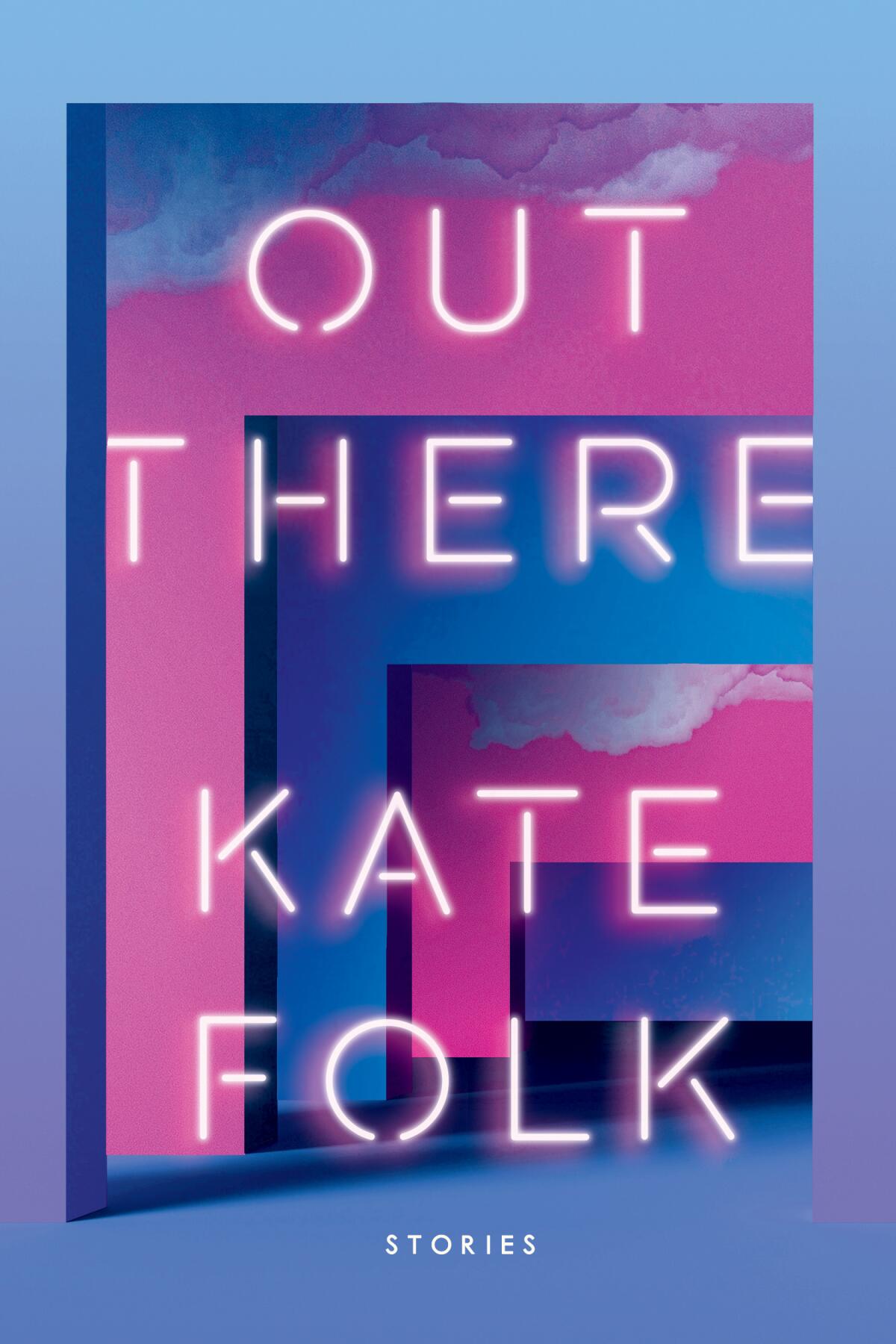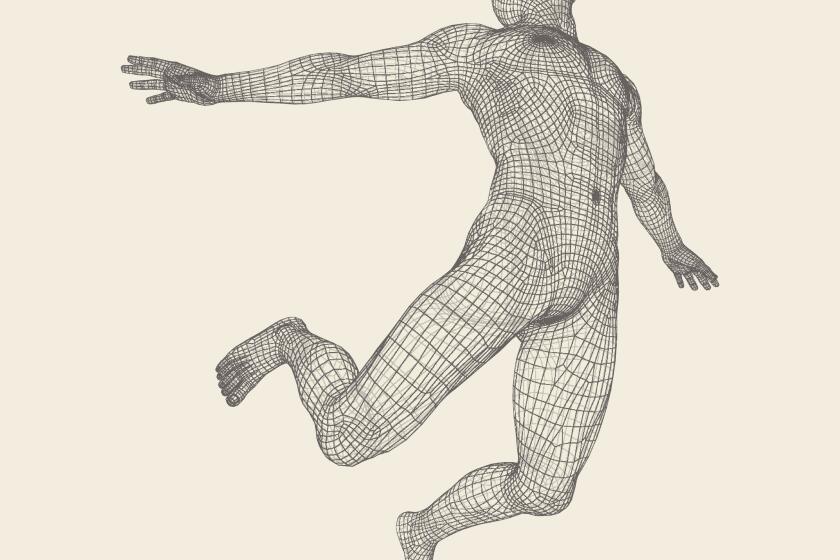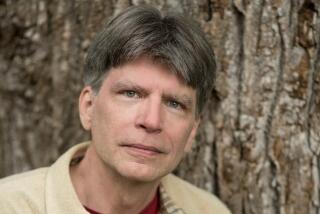Review: Flipping the gender script on menacing literary androids

On the Shelf
Out There: Stories
By Kate Folk
Random House: 256 pages, $27
If you buy books linked on our site, The Times may earn a commission from Bookshop.org, whose fees support independent bookstores.
In pop culture, female androids and artificial intelligences tend to be sexualized and treated as potential partners (“Ex Machina,” “Westworld,” “Her”). Male androids, in contrast, are super strong and hypercompetent (The Terminator series, Ultron, “Bladerunner.”) The title story of Kate Folk’s new collection “Out There” gleefully rewires those gendered tropes. The story is about blots — male AIs designed to look like handsome heartthrobs, ingratiate themselves and steal women’s data. The perfect artificial man is not a muscled savior. He’s a friendly exterior concealing a nefarious plot to seduce you and rob you of your self.
“Out There” originally ran in the New Yorker and was something of a viral sensation. Fans of the story won’t be disappointed by the collection, which also explores a gendered territory somewhere in the borderlands of magical realism, weird horror, sci-fi and literary fiction about jaded relationships. In these dreamscapes, men are less an open threat than a vaguely cloying aura, like the lavender-scented perfume into which blots dissolve once they have secured your credit cards.
In a typical Kate Folk story, a woman in an unsatisfying relationship with a man falls or is pushed out of her own life and into obsession. In “Shelter,” the narrator, who writes copy for a BDSM website, has moved to Iowa with Mark, her boyfriend of five years, so that his psychedelic metal band, Psilocybin, can record their album. She’s left alone most of the time, in a house with water in the basement and a mysterious shelter door that can only be locked from the inside.
Mark’s disinterest in these mysteries comes to signal his disinterest in her — and vice-versa. He is “suddenly not her boyfriend of five years but an unfamiliar man in his late thirties with thinning hair, a swollen stomach and small, soft hands.” That locked room, on the other hand, is charged with an obscure eroticism — like the dungeons she writes about, but more interesting. Sexual actualization is a secret chamber, absent of men.
Aliya Whiteley’s ‘Skyward Inn’ takes a premise going back to H.G. Wells — the aliens are us — to Cronenbergian levels of horror and strange beauty.
Absence, and the part men do and don’t play in it, is at the oddly evaporating center of the brief, bitterly amused “The Void Wife.” The apocalypse has come in the form of a “curtain of absence that negates everything it touches,” and Elise is desperately trying to avoid being negated while holding onto the wrong man. If you are erased while touching someone else, she hears, you will spend eternity together. Terrified of this prospect, Elise flees across the country and out to sea. On the boat she meets a guy named Robert who plays bad Dylan-like songs on the guitar and refuses to leave her side because he doesn’t want to be alone in the void. Marriage stalks Elise — a petulant, impersonal, bleak male need.
Self-alienation is a familiar feature of absurdist fiction, from Kafka to Murakami (an influence the author quotes several times). For Folk, however — as was for feminist predecessors such as Joanna Russ and Moto Hagio — the collapse of identity and meaning stems from gender expectations, which don’t so much constrict individual personhood as make it impossible to find.

That’s most clear in perhaps my favorite story of the collection, a very short piece called “Tahoe,” one of the few told from a male point of view. The narrator starts an anecdote about a tragic bachelor party accident, but he can’t remember who was injured, or when it happened, or for that matter, whether it happened to him. It’s all a vaguely masculine blur punctuated by semiforgotten hetero life events — breaking up with this girlfriend, marrying that wife. The experiences are so interchangeable they may as well have happened to someone else, or everyone else, or no one.
Lost in his own recitations of masculine ritual, “Tahoe’s” confused narrator is funny and sad — and also, maybe, ominous. When you’ve lost touch with yourself, you’re liable to do anything.
Alan Turing played one of the most consequential roles in World War II of anyone not named Hitler, Stalin or Churchill; he cracked the cipher encrypting Nazi communications for the Allies.
Folk explores these darker themes in “The Bone Ward.” It’s set in a sanitarium for people with a condition that causes their bones to melt every night. The loss of bodily integrity betokens a loss of moral coherence, as first the female narrator and then the men on the ward drift into sexual jealousy and revenge, as if they’ve been poured into molds of hate. When the men commit their quiet, weird atrocity, “Their voices are mechanical, as though they are reading from a script.” They are boneless robots; gender slips them over its hand like a puppeteer.
Men are empty, then — interchangeable, and programmed to do damage. The blots, by comparison, start to look like the better option. This is what Folk argues in the final and longest story in the collection, “Big Sur,” which returns to the world of “Out There.”
The narrator of “Big Sur” is Meg, who discovers her awkward, overly solicitous boyfriend Roger is a blot. At first, she’s repulsed and refuses to see him again. But after he is abandoned by his scammer controllers following a sting, Roger ends up homeless and desperate, and Meg starts to sympathize with him. He’s handsome and devoted to her. And he’s more trustworthy than a human boyfriend would be, because at least she knows what he’s after when he begs her to go to Big Sur. “The way he would hurt her was already known, coded into his design at the cellular level.” There’s no ambiguity. That’s comforting
Roger has to follow his programming; Meg has to follow hers. Folk’s novels don’t exactly propose a way to rewrite men or women or their relationships. The stories in “Out There” are more interested in probing for glitches in the commands, places where the narratives about gender dissolve for a moment into static — fascinating, painful, blank — before picking up the signal again.
My daughter’s Advanced Placement text teaches Black history, Indigenous history, labor history and more very, very badly.
Berlatsky is a freelance writer in Chicago.
More to Read
Sign up for our Book Club newsletter
Get the latest news, events and more from the Los Angeles Times Book Club, and help us get L.A. reading and talking.
You may occasionally receive promotional content from the Los Angeles Times.










